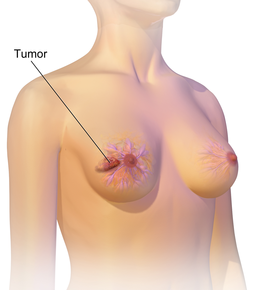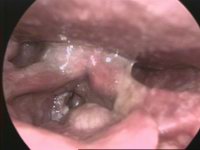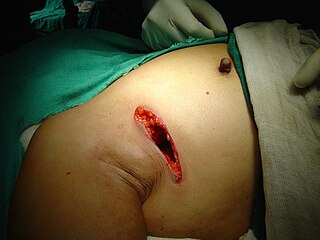
Mastectomy is the medical term for the surgical removal of one or both breasts, partially or completely. A mastectomy is usually carried out to treat breast cancer. In some cases, people believed to be at high risk of breast cancer have the operation as a preventive measure. Alternatively, some people can choose to have a wide local excision, also known as a lumpectomy, an operation in which a small volume of breast tissue containing the tumor and a surrounding margin of healthy tissue is removed to conserve the breast.

Breast cancer is cancer that develops from breast tissue. Signs of breast cancer may include a lump in the breast, a change in breast shape, dimpling of the skin, fluid coming from the nipple, a newly inverted nipple, or a red or scaly patch of skin. In those with distant spread of the disease, there may be bone pain, swollen lymph nodes, shortness of breath, or yellow skin.

Laryngeal cancers are mostly squamous-cell carcinomas, reflecting their origin from the epithelium of the larynx.
Cancer staging is the process of determining the extent to which a cancer has developed by growing and spreading. Contemporary practice is to assign a number from I to IV to a cancer, with I being an isolated cancer and IV being a cancer that has spread to the limit of what the assessment measures. The stage generally takes into account the size of a tumor, whether it has invaded adjacent organs, how many regional (nearby) lymph nodes it has spread to, and whether it has appeared in more distant locations (metastasized).

Lymphadenectomy or lymph node dissection is the surgical removal of one or more groups of lymph nodes. It is almost always performed as part of the surgical management of cancer. In a regional lymph node dissection, some of the lymph nodes in the tumor area are removed; in a radical lymph node dissection, most or all of the lymph nodes in the tumor area are removed.

The sentinel lymph node is the hypothetical first lymph node or group of nodes draining a cancer. In case of established cancerous dissemination it is postulated that the sentinel lymph node/s is/are the target organs primarily reached by metastasizing cancer cells from the tumor.

Radical mastectomy is a surgical procedure involving the removal of breast, underlying chest muscle, and lymph nodes of the axilla as a treatment for breast cancer. Breast cancer is the most common cancer among women today, and is primarily treated by surgery, particularly during the early twentieth century when the mastectomy was developed with success. However, with the advancement of technology and surgical skills, the extent of mastectomies has been reduced. Less invasive mastectomies are employed today in comparison to those in the past. Nowadays, a combination of radiotherapy and breast conserving mastectomy are employed to optimize treatment.
Breast cancer management takes different approaches depending on physical and biological characteristics of the disease, as well as the age, over-all health and personal preferences of the patient. Treatment types can be classified into local therapy and systemic treatment. Local therapy is most efficacious in early stage breast cancer, while systemic therapy is generally justified in advanced and metastatic disease, or in diseases with specific phenotypes.

Breast cancer screening is the medical screening of asymptomatic, apparently healthy women for breast cancer in an attempt to achieve an earlier diagnosis. The assumption is that early detection will improve outcomes. A number of screening tests have been employed, including clinical and self breast exams, mammography, genetic screening, ultrasound, and magnetic resonance imaging.

Breast-conserving surgery (BCS) refers to an operation that aims to remove breast cancer while avoiding a mastectomy. Other terms for this operation include: lumpectomy, wide local excision, segmental resection, tylectomy, and quadrantectomy. BCS has been increasingly accepted as an alternative to mastectomy in specific patients, as it provides tumor removal while maintaining an acceptable cosmetic outcome. This page reviews the history of this operation, important considerations in decision making and patient selection, and the emerging field of oncoplastic breast conservation surgery.

Male breast cancer is a rare cancer in males that originates from the breast. Many males with breast cancer have inherited a BRCA mutation, but there are other causes, including alcohol use disorder and exposure to certain hormones and ionizing radiation.

Bernard Fisher was an American surgeon and a pioneer in the biology and treatment of breast cancer. He was a native of Pittsburgh. He was Chairman of the National Surgical Adjuvant Breast Project at the University of Pittsburgh School of Medicine. His work established definitively that early-stage breast cancer could be more effectively treated by lumpectomy, in combination with radiation therapy, chemotherapy, and/or hormonal therapy, than by radical mastectomy.

Deborah M. Axelrod is an American surgeon who specializes in breast cancer.

In medicine, breast imaging is a sub-speciality of diagnostic radiology that involves imaging of the breasts for screening or diagnostic purposes. There are various methods of breast imaging using a variety of technologies as described in detail below. Traditional screening and diagnostic mammography uses x-ray technology. Breast tomosynthesis is a new digital mammography technique that produces 3D images of the breast using x-rays. Xeromammography and Galactography also use x-ray technology and are also used infrequently in the detection of breast cancer. Breast ultrasound is another technology employed in diagnosis & screening and specifically can help differentiate between fluid filled and solid lumps that can help determine if cancerous. Breast MRI is, yet, another technology reserved for high-risk patients and can help determine the extent of cancer if diagnosed. Lastly, scintimammography is used in a subgroup of patients who have abnormal mammograms or whose screening is not reliable on the basis of using traditional mammography or ultrasound.
Souzan El-Eid is a breast surgical oncologist at Comprehensive Cancer Centers of Nevada (CCCN), and serves as the medical director of the Breast Care Center at Summerlin Hospital, cancer liaison physician for the cancer program and co-chair of the Breast Tumor Board at Summerlin Hospital. She is also the president elect for Clark County Medical Society. She is an Adjunct Associate Professor of General Surgery at Touro University Nevada and has served as principal investigator for several clinical research studies. She is the first breast surgeon in Las Vegas certified in both ultrasound and stereotactic breast biopsies.
Laura Esserman is a surgeon and breast cancer oncology specialist. She is the director of the Carol Franc Buck Breast Care Center at the University of California, San Francisco School of Medicine. She leads the I-SPY trials, Athena Breast Health Network and the WISDOM study. Esserman is an inductee in the Giants of Cancer Care, 2018, for Cancer Diagnostics and the “less is more” approach. She performs live in the show “Audacity” which she co-created. She is also known as the “singing surgeon” for singing to her patients as they go under anesthesia.
Anne Louise Rosenberg is an American surgical oncologist retired from practice in Cherry Hill, New Jersey.
Emilia Dauway MD, FACS, FRACS is an American trained surgeon who is practicing general, breast and oncologic surgery in Australia. Dauway was co-inventor of the use of radioactive seeds in the breast to localise non-palpable breast cancers and the first in Australia to use magnetic seeds instead of radioactive seeds. This technique replaces hookwire or needle localisation improving patient safety, outcomes and satisfaction. The method was patented by the University of South Florida while Dauway was a fellow of surgical oncology. The method has been used since 1999 and has improved with the development of modern equipment. Dauway is also a Yoga Instructor, a Keynote speaker and is founder/director of Restore More, a non-profit initiative which provides education and funding to women in regional and geographically disadvantaged areas for breast cancer treatment and reconstruction.

Herbert Lumley Snow was an English surgeon, anti-vivisectionist, cancer researcher and medical writer.
Somashekhar SP is an Indian robotic surgeon, author and chairman of Surgical Oncology Manipal Comprehensive Cancer Center. He is the president of the association of Breast Surgeons of India and Editor in Chief of IJGO Springer Indian Journal of Gynec Oncology and Council member of The association of surgeons of India. He is also the Editor of Annals of Breast Diseases.













